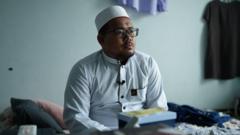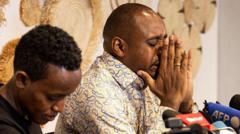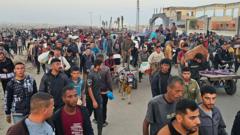In the aftermath of a catastrophic earthquake in Myanmar, Soe Nay Oo, a former imam, faces profound sorrow over the deaths of nearly 170 loved ones, primarily from his community, while navigating challenges in providing aid amidst political unrest.
Grief Strikes as Myanmar's Earthquake Takes a Heavy Toll on Community

Grief Strikes as Myanmar's Earthquake Takes a Heavy Toll on Community
A former imam mourns the loss of 170 beloved community members following a devastating earthquake in Myanmar, exacerbated by ongoing political strife.
The recent earthquake that struck Myanmar has left a deep emotional scar, particularly for Soe Nay Oo, a former imam who now helps a human rights organization in Thailand after fleeing the 2021 coup. The tragedy unfolded in Sagaing last Friday during the Muslims' last Friday prayers of Ramadan, leading to the collapse of three mosques, including the largest one, Myoma, resulting in enormous loss of life.
Soe Nay Oo, feeling the tremors in Mae Sot, learned that around 170 members of his former congregation, including relatives and friends, had perished. "I can't hold back my tears," he shared with BBC journalists, reflecting on the devastating wave of grief enveloping him and other survivors. As the confirmed death toll soars above 2,700 with countless others still unaccounted for, the urgent necessity for shelter and food compounds the disaster's impact.
Reports suggest that approximately 500 Muslims lost their lives while gathered for prayer, as the mosques collapsed under the quake's brutal force. Eyewitnesses indicate that Myoma Street, which housed these worship places, was critically damaged, leaving many homeless and in need of support, with food supplies dwindling.
Amidst this tragedy, Soe Nay Oo mourns individuals who were integral parts of his life—the loss of one cousin, whom he described as a guiding light, stands out as the most painful. Other community leaders, such as the only female trustee of the Myoma mosque, were also tragically lost, underlining the rich tapestry of connection within the community.
The impact of the earthquake reverberates through the Muslim community, as burial practices remain disrupted due to ongoing military conflicts complicating access to cemeteries. Soe Nay Oo describes the sorrow felt by the bereaved at not being able to lay their loved ones to rest, a significant element of Islamic faith disrupted by despair.
Communal efforts are being made to coordinate rescue and support, although the emotional toll is staggering. Soe Nay Oo expresses survivor's guilt, longing to lend guidance and aid during the crisis. "I feel guilty for not being in Myanmar," he lamented, emphasizing his commitment to providing any assistance he can muster from his current refuge.
With many still in dire need, he remains steadfast in his dedication to helping others in his community while grappling with unrelenting grief, ensuring that the memory of those lost lasts on.


















